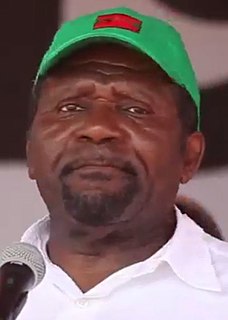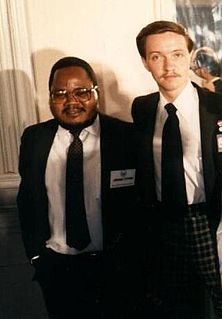
Angola is a country in southwestern Africa. The country's name derives from the Kimbundu word for king. It was first settled by San hunter-gatherer societies before the northern domains came under the rule of Bantu states such as Kongo and Ndongo. From the 15th century, Portuguese colonists began trading, and a settlement was established at Luanda during the 16th century. Portugal annexed territories in the region which were ruled as a colony from 1655, and Angola was incorporated as an overseas province of Portugal in 1951. After the Angolan War of Independence, which ended with an army mutiny and leftist coup in Lisbon, Angola's independence was achieved on November 11, 1975 through the Alvor Agreement. After independence, Angola later entered a period of civil war that lasted up until 2002.

José Eduardo dos Santos is an Angolan politician who served as President of Angola from 1979 to 2017. As President, José Eduardo dos Santos was also the commander in chief of the Angolan Armed Forces (FAA) and President of the People's Movement for the Liberation of Angola (MPLA), the party that has ruled Angola since it gained independence in 1975. He was the second-longest-serving president in Africa, surpassed only by President Teodoro Obiang Nguema Mbasogo of Equatorial Guinea, who took power less than two months before dos Santos.

Elections in Angola take place within the framework of a multi-party democracy and a presidential system. The National Assembly is directly elected by voters, whilst the leader of the largest party or coalition in the National Assembly automatically becomes President. The country is currently a one-party dominant state, with the MPLA as the dominant party.

Isaías Henrique Ngola Samakuva is an Angolan politician who has been the President of the National Union for the Total Independence of Angola (UNITA) since June 2003.

The National Assembly is the legislative branch of the government of Angola. The National Assembly is a unicameral body, with 220 members: 130 members elected by proportional representation and 90 members elected by provincial districts.

Jeremias Kalandula Chitunda served as the Vice President of UNITA until his assassination in Luanda, as part of the Halloween Massacre shortly after the first round of the presidential election, held on September 29–30. He was UNITA's second in command, after UNITA leader Jonas Savimbi.

Legislative elections were held in Angola on 5 and 6 September 2008, as announced by President José Eduardo dos Santos on 27 December 2007. They were the first since the 1992 general elections, which had led to the outbreak of the second phase of the Angolan Civil War, which continued until 2002.

General elections were held in Angola on 29 and 30 September 1992 to elect a President and National Assembly, the first time free and multi-party elections had been held in the country. They followed the signing of the Bicesse Accord on 31 May 1991 in an attempt to end the 17-year-long civil war. Voter turnout was 91.3% for the parliamentary election and 91.2% for the presidential election.
The 2000s in Angola saw the end of a 27-year-long civil war (1975–2002) and economic growth as foreign nation's began to invest in Angola's untapped petroleum reserves. The government continues to resettle internally displaced persons as its economy recovers and expands.
Democratic Front of Cabinda is a separatist rebel group that fights for the independence of Cabinda province from Angola.
Eduardo Jonatão "Dinho" Chingunji served as a political leader in UNITA, a pro-Western rebel group in Angola. During Angola's civil war (1975–2002), all of Chingunji's brothers died in mysterious circumstances, except for him. Rumors attributed their deaths to assassination plots ordered by UNITA leader Jonas Savimbi.
In the 1990s in Angola, the last decade of the Angolan Civil War (1975–2002), the Angolan government transitioned from a nominally communist state to a nominally democratic one, a move made possible by political changes abroad and military victories at home. Namibia's declaration of independence, internationally recognized on April 1, eliminated the southwestern front of combat as South African forces withdrew to the east. The MPLA abolished the one-party system in June and rejected Marxist-Leninism at the MPLA's third Congress in December, formally changing the party's name from the MPLA-PT to the MPLA. The National Assembly passed law 12/91 in May 1991, coinciding with the withdrawal of the last Cuban troops, defining Angola as a "democratic state based on the rule of law" with a multi-party system.

The People's Republic of Angola was the self-declared socialist state which governed Angola from its independence in 1975 until 1992, during the Angolan Civil War.
This article deals with the activities of the U.S. Central Intelligence Agency (CIA) in Angola. The list of activities may be incomplete due to the clandestine nature of the subject matter.

Legislative elections were held in Angola on 31 August 2012. During campaigning, the opposition UNITA and its offshoot CASA-CE accused and criticised the government of corruption and called for greater transparency; this also led to protests and arrests the day before the election. These were the first elections after the new 2010 Constitution was instituted.














